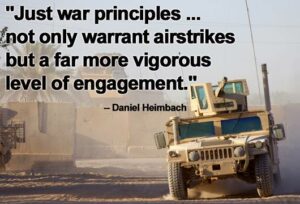By David Roach

With ISIS beheading a second American journalist and controlling a large section of Iraq and Syria, analysts say military action against the terrorist group aligns with traditional, just war principles.
“Full application of just war principles does not only warrant airstrikes but a far more vigorous level of engagement as well,” Daniel Heimbach, a seminary professor who was instrumental in developing the just war ethic for the 1991 Gulf War, told Baptist Press in written comments.
War with ISIS — the acronym for Islamic State of Iraq and Syria — has been discussed increasingly following ISIS videos showing the beheading of two American journalists — James Foley in an Aug. 19 video and Steve Sotloff on Sept. 2.
The U.S. has launched airstrikes against ISIS in Iraq and is considering similar action in Syria.
Douglas Carver, executive director of chaplaincy at the North American Mission Board, agreed with Heimbach that there is just cause to wage war against ISIS.
Carver, former U.S. Army chief of chaplains who advised commanders and soldiers on the ethics of warfare as a chaplain, told BP that America has “a just reason and right to restore order to the chaos in the world.”
Eliminating this “evil cancer that seems to be growing” would serve a just cause, Carver said, referencing one of the principles of just war theory.
“We have now had two of our journalists that have been beheaded. We have unrest and fear in southwest Asia like never before,” Carver said. “We have a lack of respect for humanity of all genders and all ages. We have this plague of terrorism that intends to destroy what we understand as a way of life.”
Traditionally, Judeo-Christian societies have deemed a war “just” if it satisfies a list of criteria drawn from the Bible and classical Greek and Roman tradition. Carver and Heimbach agreed that a war with ISIS would satisfy those criteria. Among the just war principles that a nation must consider before going to war:
— Just cause. There must be a specific act of injustice to be corrected.
— Competent authority. The decision to wage war should only be made by the person or governing body responsible for maintaining a nation’s civil order and security.
— Right intention. The intended result of going to war must be to restore a previous state of peace and civil order.
— Last resort. All realistic nonviolent alternatives must be exhausted before going to war.
—Probability of success. There must be a realistic hope of achieving victory.
— Proportionality of projected results. The good expected upon attaining victory must be greater than estimates of what it will cost to achieve victory.
Once a nation goes to war, just war theory demands that additional principles be followed amid the fighting to protect human dignity and minimize loss of life. Among those principles:
— Proportionality in the use of force. Force in war must be limited to what is required to attain legitimate military goals.
— Discrimination. Soldiers must distinguish between combatants and noncombatants and not seek to destroy noncombatants or their property.
— Right spirit. Soldiers should always regret using deadly force to harm people and property. They should love their enemies even while fighting.
Baptist Press has addressed just war principles previously surrounding the war on terror in Iraq and Afghanistan, the 1999 U.S. bombings to stop ethnic cleansing in Kosovo and the 1991 Persian Gulf War.
In the present conflict, “the just cause principle is most clearly met in defending the established governments of Iraq, Syria and other nations threatened by the ISIS onslaught,” said Heimbach, senior professor of Christian ethics at Southeastern Baptist Theological Seminary who was an adviser to President George H.W. Bush in developing the just war ethic for the 1991 Gulf War.
“The competent authority principle is met when the recognized leaders of those nations appeal to us for help and that help is authorized by the Congress of the United States (not the President acting alone),” Heimbach said in his written comments.
The probability of success and value of ultimate victory will help determine how much force the U.S. should employ against ISIS, Heimbach said.
“The reality we must not ignore is how responding to ISIS with too little will make matters a lot worse, and responding to ISIS too late will make success less likely and a lot more costly,” he said.
More extensive military operations than airstrikes alone probably will be required to stop what Heimbach described as the “tyrannical aggression” of ISIS. While the U.S. should not unnecessarily target people and destroy personal property, it should use “every bit of force necessary” to “remove ISIS as a destabilizing force in the world.”
Carver cautioned against rushing to judgment against President Obama and other politicians who seem to be “dragging their feet” regarding war. A war is only just if waged as a last resort after employing the nation’s economic, political and diplomatic power in an attempt to secure peace, he said.
But Carver expressed concern that amid “cultural secularization,” some elected and appointed American policy makers have insufficient grounding in the Judeo-Christian tradition to understand and apply just war theory.
Much of just war theory is drawn from the Old Testament, although Scripture does not use the phrase “just war.” Proponents of just war theory point to Abraham’s use of just war principles to rescue Lot in Genesis 14, God’s requirement that Israel fight pagan nations in humane ways in Deuteronomy 20 and God’s condemnation of Israel’s enemies for waging war in brutal and barbaric ways in Amos 1.
Because just war theory is being dropped from some military training programs, churches have a duty to disciple soldiers and policy makers in Scripture’s teachings about the ethics of war, Carver said.
In 2011 Baptist Press reported that an ethics class on just war theory at the U.S. Air Force Academy was halted because complaints were raised about Scripture being used in teaching materials.
“We have secularized the discussion on the just war theory,” which Carver said is traditionally regarded as an important element in the theology and philosophy of great Christians like Augustine and Thomas Aquinas.
In the end, prayer is the most powerful weapon for believers concerned that America is losing its ethical moorings, Carver said.
“Whether we go to war with ISIS or not, we need at least to pray,” Carver said. “And we also know in faith that God is going to be glorified because He’s King over all the nations. With all the anxiety of whether we should go to war or not, maybe God is using this to turn us back to Him.” –Baptist Press
http://www.bpnews.net/43278/isis-terror-threat-gives-impetus-to-just-war-strategists-say



